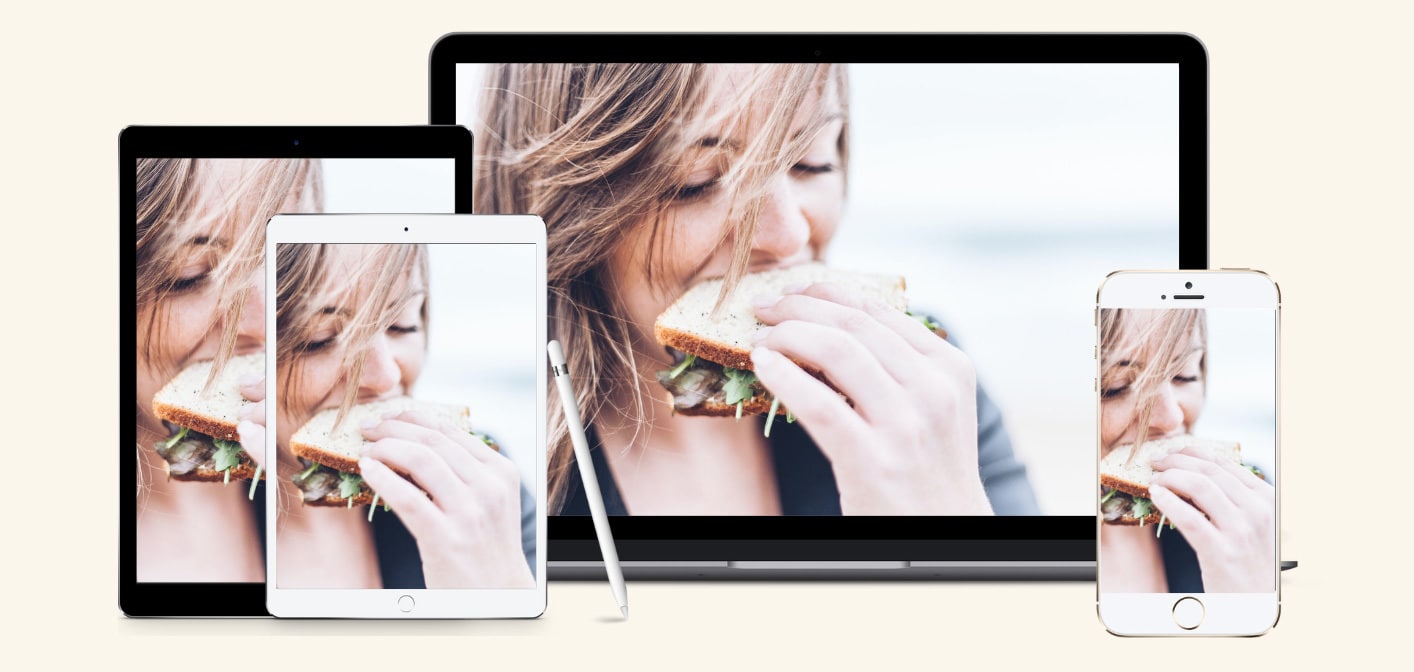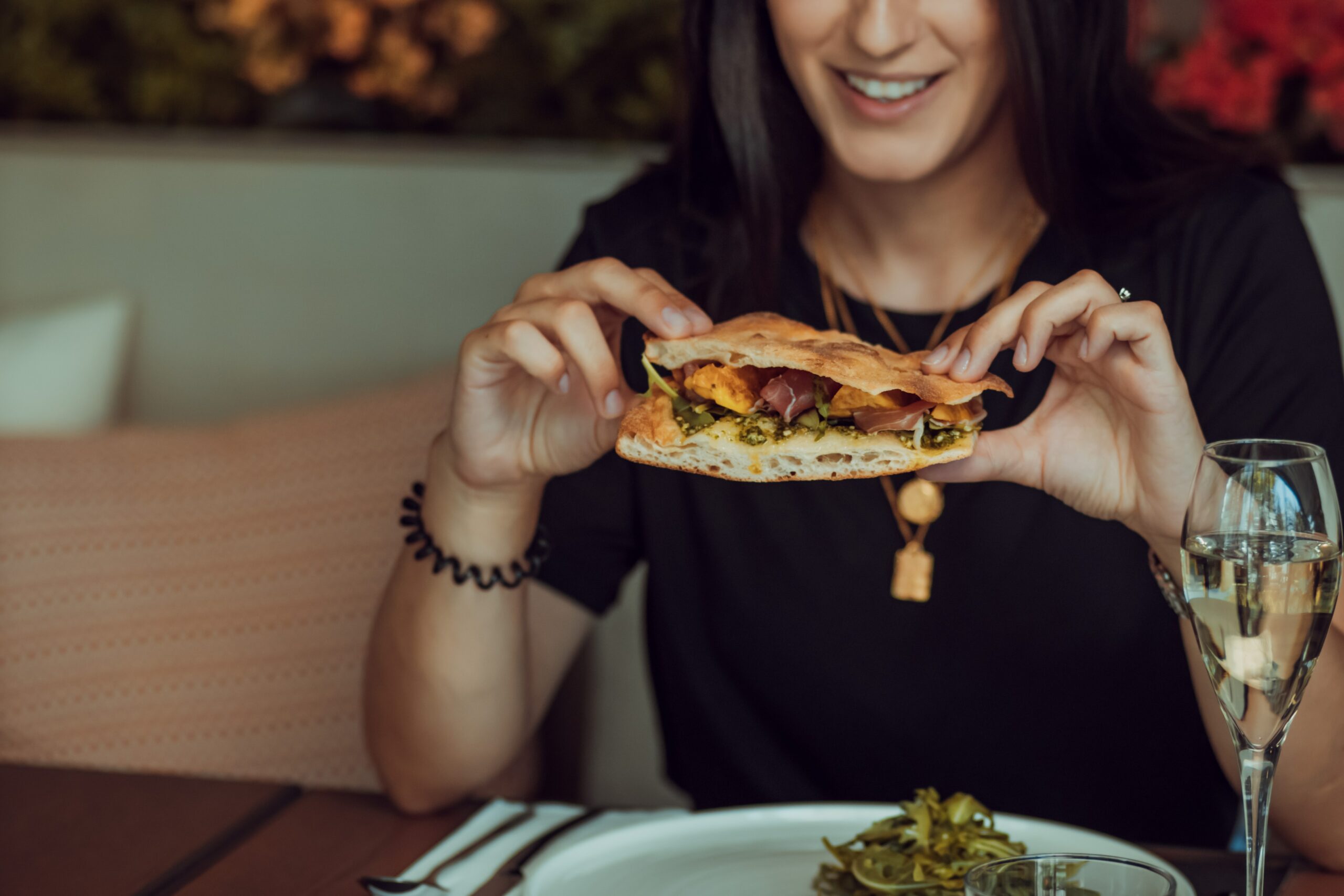So… can you trust your hunger?
The short answer for most people is yes, you can trust your hunger. But you may be thinking that’s not the case for you. And if you did listen to and trust your hunger signals, you would just eat and eat and eat until you burst.
Let’s dive into this subject some more, to help you understand how hunger works, why you might be struggling to trust it, and what you can do to gain control of your eating habits.
Why do we need hunger?
The short answer is, for survival. From the moment we’re born, a healthy baby’s primal instincts lead them to suck on the mother’s nipple, to find the sweet and salty taste of milk.
Hunger signals exist to let us know that our body is running low on energy.
As the stomach empties, ghrelin (the hunger hormone) is produced in the gut. It travels to the hypothalamus, a part of the brain that regulates appetite. The hypothalamus then sends a strong signal to your body that energy supply is low. Ghrelin levels (and your appetite) continue to rise until you start to eat.
We evolved to feel hunger for a reason. These signals are there to tell you that your body needs nourishment.
This is clearly displayed in infants. When we’re young, we’re really in touch with when we’re hungry (we cry for food), and when we’re full (turn our head away from the nipple/bottle). We are intuitive and can differentiate between hunger and fullness.
However, as we get older, and get messages about food, and our bodies, we tend to try and find ways to manipulate our hunger levels.
For example, there are well-meaning comments like “finish your vegetables before you can have your pudding”. This moralising of food as “good” and “bad” can result in us learning to eat past the point of comfortable fullness, to get to the more “fun food”. This is one example, of many. It stems from diet culture that teaches us we need to eat in a way to “fix” our bodies into a size society deems to be acceptable. And that we can’t be trusted, and must follow external cues (portion sizes, points, calories) to tell us how, when and what to eat. It’s no wonder that we can no longer trust our bodies when society from every angle is telling us we can’t.
If you feel like you can’t trust your hunger, you are certainly not alone. With the right tools and plenty of practice, it’s possible to get back to a place of trusting and honouring your hunger. And therefore, eating in line with your body’s natural cues and needs.
Reasons you may not trust your hunger…
I’m guessing if you’ve clicked on this article you have spent time in your life out of touch with, distrusting, or actively ignoring your hunger signals. Can it really be truly wise and safe to trust your hunger? Perhaps you feel you are hungry too often.
If you feel wary about trusting your hunger, you certainly aren’t alone.
Below, our clients describe some very common fears and struggles in rebuilding trust in their hunger and bodies in general:
“Trusting myself around food. Especially when alone and there are no limits. I am not in touch with what my body wants/needs.”
“The overload of available information on what I should or shouldn’t be eating, how I should or shouldn’t look. This means being constantly disciplined, thin, healthy, happy and IN CONTROL.”
“I don’t listen to my body. I eat what I think I must eat instead of what I want to eat.”
Usually, we are afraid to trust our hunger due to fears of losing control of our eating and/or gaining weight.
In reality, most people find when they respond to hunger cues consistently, they end up feeling more in control of food and able to find their natural and healthy weight (otherwise known as the set-point weight).
Consistently ignoring your hunger can cause problems
We receive a lot of messaging that teaches us to go to our heads to make decisions around food (“eat this and don’t eat that”). As opposed to connecting with the inner cues from our bodies and what they need. While we do need to use our minds to make decisions, there is a difference between a diet-driven mindset (restrictive/harsh) and a self-care mindset (actions that truly take care of you).
For example:
(a) “I can’t possibly be hungry. I just ate lunch a couple of hours ago. Eugh, Why do I always feel hungry” (diet mindset, results in guilt, not honouring body)
And
(b) “I’m noting hunger signals despite eating lunch a couple of hours ago (curious mindset). Maybe my body needs more food today. I better eat something (connecting with the body, recognising the need to eat, which is a self-care, compassionate mindset)”
Listening to the diet mindset (a), can create body distrust, and disconnected eating. It can mess with our relationship with food.
How do I train myself to trust hunger and intuitively eat?
Intuitive eating is a tool that can help you re-discover and rebuild trust with your hunger cues.
Intuitive Eating is an evidence-based approach to help improve your relationship with food and have better self-control around food. This framework can help you learn to honour your health by listening and responding to the messages of your body. This helps you to meet your physical and mental needs based on your terms and move away from external diet tools such as the time of day, points systems, calorie tracking, rigid rules or meal plans – which can all make us more likely to eat when food isn’t really what’s going to satisfy us. Intuitive eaters can also discern between physical hunger and emotional hunger.
You can learn more about Intuitive Eating here.
It is extremely common after years of dieting and eating according to external rules to lose touch with what it feels like to be hungry or full. Don’t stress, you are not broken. These signals are still there and you can learn to hear them again. Due to our biology, it’s very hard to stop eating when your body needs food, so getting in touch with early hunger signals is important. It will just take some time and a bit of trial and error.
A great place to start is my free guide which runs through some of the key principles of Intuitive eating.
What is the first step of intuitive eating?
A fundamental step is to become aware of the huge negatives of dieting/restrictive eating and be ready to let go of these behaviours. This is principle no. 1 of Intuitive Eating, “Reject Diet Culture”. Having this knowledge of the research base behind the Intuitive Eating framework helps to trust the rest of the steps/principles, including “Honour/trust Your Hunger”.
Learn more about the pitfalls of dieting here: “Why can’t I stick to a diet?”
The next best step of Intuitive Eating for you can also depend on where you’re at as an individual. This is why working with a professional can be helpful. They can help guide and potentially fast-track your food freedom journey.
Intuitive Eating Tips for Those Starting Out
Does intuitive eating work?
We have written another article that answers this question – find it by clicking here.
Hint: it depends on what “work” means to you. If it means eating a nutritious, varied diet, feeling free of food obsession, healing binge eating, feeling good in your body, and improving your self-esteem… then yes, intuitive eating works!
A note on eating disorder recovery and medications
There are some instances where your hunger signals may be less accurate indicators of how much food your body needs.
If you are in the early stage of recovery from an eating disorder, your hunger signals are likely not an accurate indicator of how much food your body needs. The body can feel prematurely full due to a slower digestion rate. A more structured approach may be necessary to reconnect you to your body’s appetite cues before moving on to relying on hunger.
Some medications and medical conditions can increase appetite. The most common appetite-inducing medications include antipsychotics, antidepressants, mood stabilisers, corticosteroids, and anti-seizure drugs. If you think your medications are interfering with your appetite, it’s best to speak to your healthcare provider.
Do you want to work with a qualified dietitian and Certified Intuitive Eating Counsellor who nurtures a good relationship with food? You can read more about what that looks like here.







